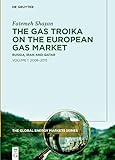The Gas Troika on the European Gas Market : Russia, Iran and Qatar Volume 1: 2008–2015 / Fatemeh Shayan.
Material type: TextSeries: The Global Energy Markets Series ; 2Publisher: Berlin ; Boston : De Gruyter, [2023]Copyright date: ©2023Description: 1 online resource (XIV, 239 p.)Content type:
TextSeries: The Global Energy Markets Series ; 2Publisher: Berlin ; Boston : De Gruyter, [2023]Copyright date: ©2023Description: 1 online resource (XIV, 239 p.)Content type: - 9783110995763
- 9783110982176
- 9783110981957
- 382/.4220947 23/eng/20230330
- online - DeGruyter
- Issued also in print.
| Item type | Current library | Call number | URL | Status | Notes | Barcode | |
|---|---|---|---|---|---|---|---|
 eBook
eBook
|
Biblioteca "Angelicum" Pont. Univ. S.Tommaso d'Aquino Nuvola online | online - DeGruyter (Browse shelf(Opens below)) | Online access | Not for loan (Accesso limitato) | Accesso per gli utenti autorizzati / Access for authorized users | (dgr)9783110981957 |
Browsing Biblioteca "Angelicum" Pont. Univ. S.Tommaso d'Aquino shelves, Shelving location: Nuvola online Close shelf browser (Hides shelf browser)

|

|

|

|

|

|

|
||
| online - DeGruyter Poetae Comici Graeci : (PCG). Volumen I, Comoedia Dorica Mimi Phlyaces / | online - DeGruyter Frühgriechische Spiegel : Aspekte technischer Neuerungen in der Antike / | online - DeGruyter De/lirios : Las líricas desviadas de Mario Levrero y Alberto Laiseca / | online - DeGruyter The Gas Troika on the European Gas Market : Russia, Iran and Qatar Volume 1: 2008–2015 / | online - DeGruyter The ›Epigramma Paulini‹ : Critical Edition with an Introduction, Translation and Commentary / | online - DeGruyter Echoes from Russia's Colonial Past : The Pre-revolutionary Files of the Kalmyk National Archive / | online - DeGruyter The Reception of Ancient Cyprus in Western Culture / |
Frontmatter -- Acknowledgments -- Foreword -- Contents -- Part I: Approach -- 1 Introduction -- 2 The Social Structuration Theoretical Framework -- Part II: Analyses -- 3 Russia’s Energy Policies in the German Gas Market -- 4 Iran’s Energy Policies in the European Gas Market -- 5 Qatar’s Energy Policies in the British LNG Market -- 6 Gas-Troika Organization’s Energy Policies in the European Gas Market -- Part III: Conclusion -- 7 Conclusion: Findings Regarding Gas-Troika Organization’s Policies in the European Gas Market -- Appendices -- References -- List of Abbreviations -- List of Figures -- List of Tables -- About the Author -- Index
restricted access online access with authorization star
http://purl.org/coar/access_right/c_16ec
The Gas Troika on the European Gas Market assesses the energy policy of the Gas Troika Organization (GTO) as an entity and its members, Russia, Iran and Qatar, operating in the European gas market (EGM) between 2008 and 2015. The book focuses on their interests, policies and frameworks, and the enabling and constraining factors they encounter in the European market. The energy policies of the GTO members are discussed in the context of extraction and distribution of natural gas, its export to the European countries and the environmental side-effects of these contracts. The important questions examined in this pioneering study are: How do the GTO members develop their interests and energy policies in the European environment? How do the common interests and policies of the GTO members explain the framework of the organization in the EGM? How is this organization perceived and assessed as a semi-coherent regional entity? The book applies a social structuration theoretical framework with respect to geographical resources, economy, international relations and environmental dimensions to provide a multi-disciplinary assessment. Researchers in energy economics and political sciences, as well as energy analysts and consultants will find this book to be extremely beneficial.
Issued also in print.
Mode of access: Internet via World Wide Web.
In English.
Description based on online resource; title from PDF title page (publisher's Web site, viewed 06. Mrz 2024)


